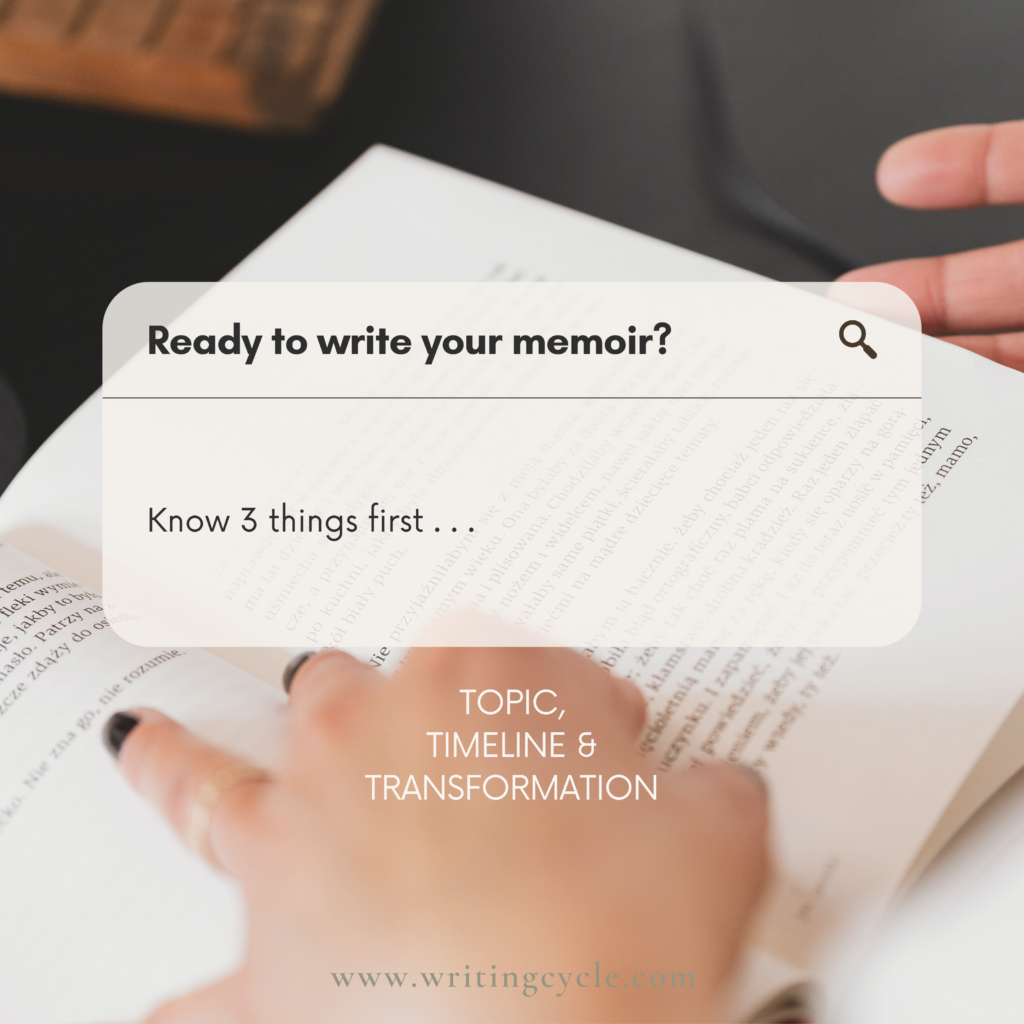The Best (and Worst) Reasons to Write a Memoir
80% of First-Time Memoirists Make These Mistakes.

Thousands of people who “survive life” each year believe they should write a book about what they’ve experienced in order to help others.
But is this, in itself, a good idea?,
When should you actually write a memoir? When shouldn’t you? And what tools do you need to craft a book people will want to read?
Avoid common memoir mistakes by recognizing the best and worst reasons to write a memoir, and then ensure your manuscript meets publishing standards without sacrificing authenticity by using the exercises and memoir-writing tips in: How to Make My Memoir Read Less Like Autobiography and Topic, Theme, Transformation: Memoir’s 3 Essential Pillars.
THE BEST (AND WORST) REASONS TO WRITE A MEMOIR
5 GREEN LIGHTS FOR MEMOIR WRITING
1. ✨ You’re a professional writer.
Creative writing is a profession, not merely a hobby. And, once you plan to charge people for a product, it becomes a business as well.
People spend years studying how to write a memoir. Traditionally-published authors often work with an editorial team of up to a dozen people on projects. If you are a writer by training or trade, you likely have developed skills to shape a story that could offer comfort, insight, or assistance to millions.
If you have not yet mastered craft, a memoir may not prove the most effective route for you to reach an audience. After all, there are many ways to get stories into the world. Determine if you’re primarily interested in expression, or in the art of writing as well: this will inform whether or not you should pursue memoir as your vehicle.
2. ✨ You have a platform.
If you already have a large platform, you are in a unique position to bring visibility to an issue, possibility precipitating real change. This allows you to bring attention to material in a way a new or relatively unknown author cannot.
Perhaps you have some celebrity, are affiliated with a huge organization, cover an especially hot topic, or have spent a few years building a platform from which to directly access an aligned audience.
Platforms aren’t limited to social media. Influential authors leverage organizations they volunteer for, large email lists they remain in consistent contact with, and successful coaching or therapy practices / speaking engagements / nonfiction books to build community.
3. ✨ You’re a unicorn.
You’ve survived something that currently lacks representation or visibility. There aren’t dozens of other memoirs on this subject out there. Or, you’re the member of a group whose voice has not been heard; therefore, there is a real need for someone to bring this experience into mainstream consciousness.
While no one should bear the burden of representing an entire group or experience, being an initial author on a topic can offer an advantage when it comes to marketing and approaching organizations with which to align.
4. ✨ You take a fresh approach.
You’re taking a new or controversial approach to material. The way you’re approaching your subject isn’t just at an angle, but in opposition to how it’s been presented in the past. (This means your text is free of takeaways such as, “you only live once” or “this too shall pass.”) Instead, you’re courting controversy to make a key point.
5. ✨ You care more about “why?” than “what?”
Memoir rests on depth and profundity of insight when reflecting upon past events. What makes for a great memoir is an ordinary life delivered with great insight.
Remember: You’re not as interesting as events which befell you—you’re as interesting as your insight.
If you’ve honed your powers of introspection, reflection, and voice, you have a lot to offer.
Do you need to meet all these memoir-writing requirements? NO. But you should meet TWO-THREE.
5 RED LIGHTS FOR MEMOIR WRITING
1.✨ Your book is unfocused.
You can’t pitch it in a sentence. You can’t identify the topic, timeline, and transformation: all of which are SINGULAR. You aren’t sure what topic to be blogging or speaking about to build an audience.
Every life contains many themes and could be related as a comedy, tragedy, hero’s journey, or love story . . . but when you write memoir, you must make choices: WHICH trope to center your narrative around, which stylistic approach to take, which subject you will narrow your focus to explore.
2. ✨Your timeline is longer than a year.
Are you looking at a moment that thematically represents a life, or are you trying to tackle an entire life, as an autobiography might?
Bracket your story by selecting a tight timeframe around which to focus the plot, and choose only relevant moments from throughout your past to weave in via backstory.
Another successful approach includes using an event with a built-in climactic moment to stand in place of a clock to structure a book, indicating the end of memoir’s timeline from the outset, such as a trial, competition, roadtrip, mystery, or milestone event.
The tighter the timeline, the greater the tension.
3.✨ You’re writing chronologically.
Stop.
No one has taken in a story from a purely chronological perspective in decades. (After all, any time you mention an event that has occurred prior to the present moment, you are technically fracturing chronology.)
People have different expectations of material today. Forms are hybrid. Chapters are shorter. What was experimental is now expected. Nothing is completely linear. Tones and tastes change. Technology has completely changed. Not only does the way we read change if we’re reading an e-book versus a printed title, but representation of technology in stories must accurately reflect whenever they are set/written. You have to not only reflect all the ways technology and society has evolved, you have to understand how linearity has evolved.
If you’re writing a book that feels like it could have been written hundred years ago, you’re going to have a harder time finding readers to buy it.
4.✨ You’re throwing in everything . . . including the kitchen sink.
Art lies in knowing what to edit out as much as what to include.
If you’re including events simply because they occurred, not because they are directly relevant to the plot, you’re going to have an unwieldy book that needs rewriting. If a scene doesn’t relate to your transformation, cut.
5.✨You have an interesting life, but not an interesting perspective.
An interesting life does not make for an interesting memoir. A interesting take on life makes for an interesting memoir.
Memoir is less about the events, than why these may have occurred, how meaning is made from them, and what fresh voice and perspective gets brought to any particular subject.
Focus on reflection, theme, and voice to make your memoir stand out from similar titles, and empower you as a co-creator of your life’s journey.
Turn stop signs into speed-bumps by improving your manuscript with free exercises from TWC blog or book coaching and professional editing services.
Leave a Reply Cancel reply
Submit
LET's GET STARTED.
Hi, I'm Carol,
an Arizona-based editor who turns ideas into art. Need to get your book publication-ready?
Receive
Copyright © 2022 The Writing Cycle
Brand Photos By: Hayley Stall Matt Allen
Sign up for our quarterly newsletter and gain immediate access to free writing resources.
Stock Photos By: Styled Stock House


